Counseling Ethics: A Detailed Look at Ethical Theories and Application
VerifiedAdded on 2023/04/04
|7
|1314
|260
Essay
AI Summary
This essay provides a comprehensive overview of ethics in counseling. It begins by defining ethics and exploring various ethical theories, including meta ethics, normative ethics, and applied ethics. The essay then introduces counseling and its different types: individual, couples, family, and group counseling. A significant portion of the essay is dedicated to the principles of ethics in counseling, such as autonomy, trustworthiness, beneficence, non-maleficence, and justice, explaining their importance in maintaining a healthy counselor-client relationship. The essay emphasizes the role of ethics in navigating dilemmas and ensuring fair and supportive service for every client. The conclusion summarizes the importance of ethics in fostering a strong bond between counselor and client.
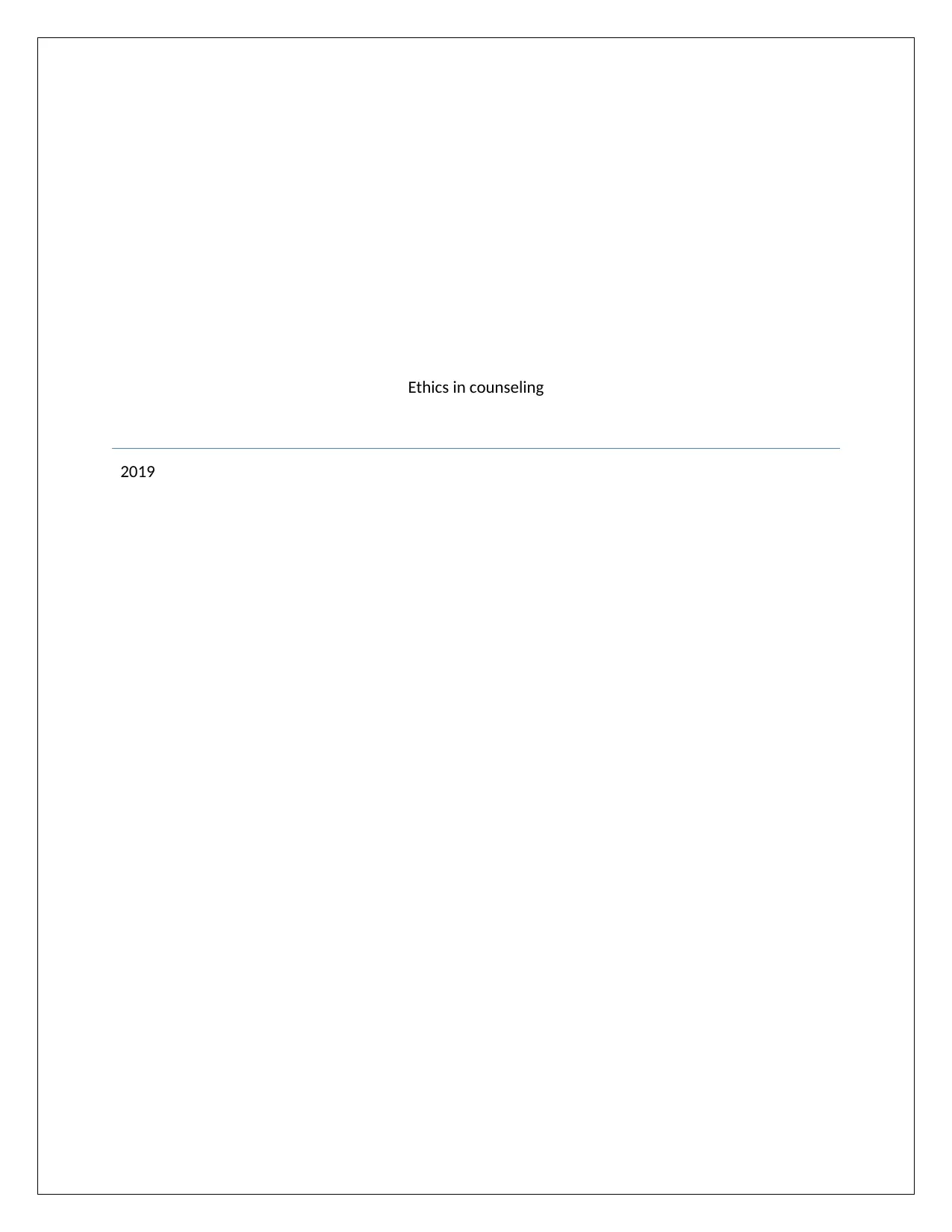
Ethics in counseling
2019
2019
Paraphrase This Document
Need a fresh take? Get an instant paraphrase of this document with our AI Paraphraser
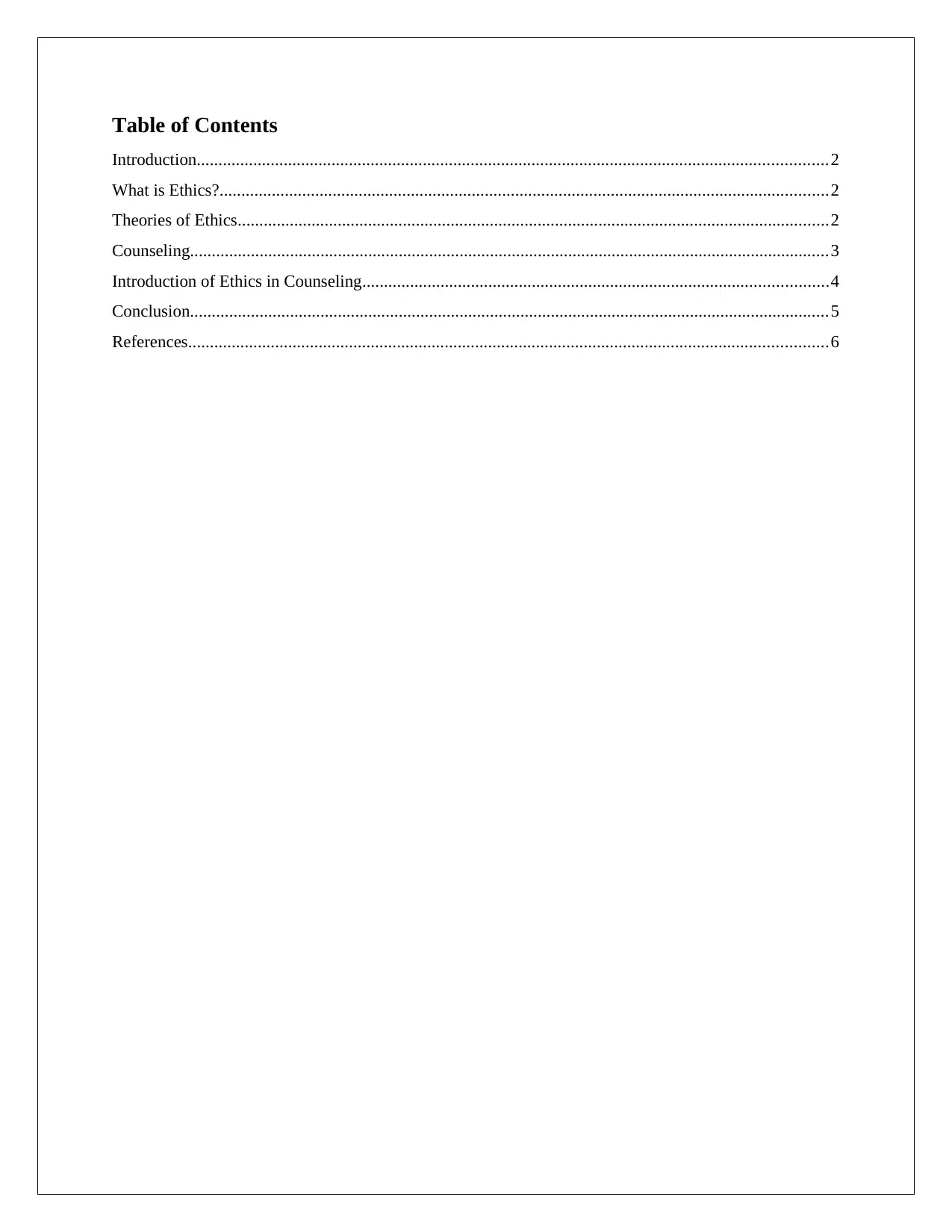
Table of Contents
Introduction.................................................................................................................................................2
What is Ethics?............................................................................................................................................2
Theories of Ethics........................................................................................................................................2
Counseling...................................................................................................................................................3
Introduction of Ethics in Counseling...........................................................................................................4
Conclusion...................................................................................................................................................5
References...................................................................................................................................................6
Introduction.................................................................................................................................................2
What is Ethics?............................................................................................................................................2
Theories of Ethics........................................................................................................................................2
Counseling...................................................................................................................................................3
Introduction of Ethics in Counseling...........................................................................................................4
Conclusion...................................................................................................................................................5
References...................................................................................................................................................6
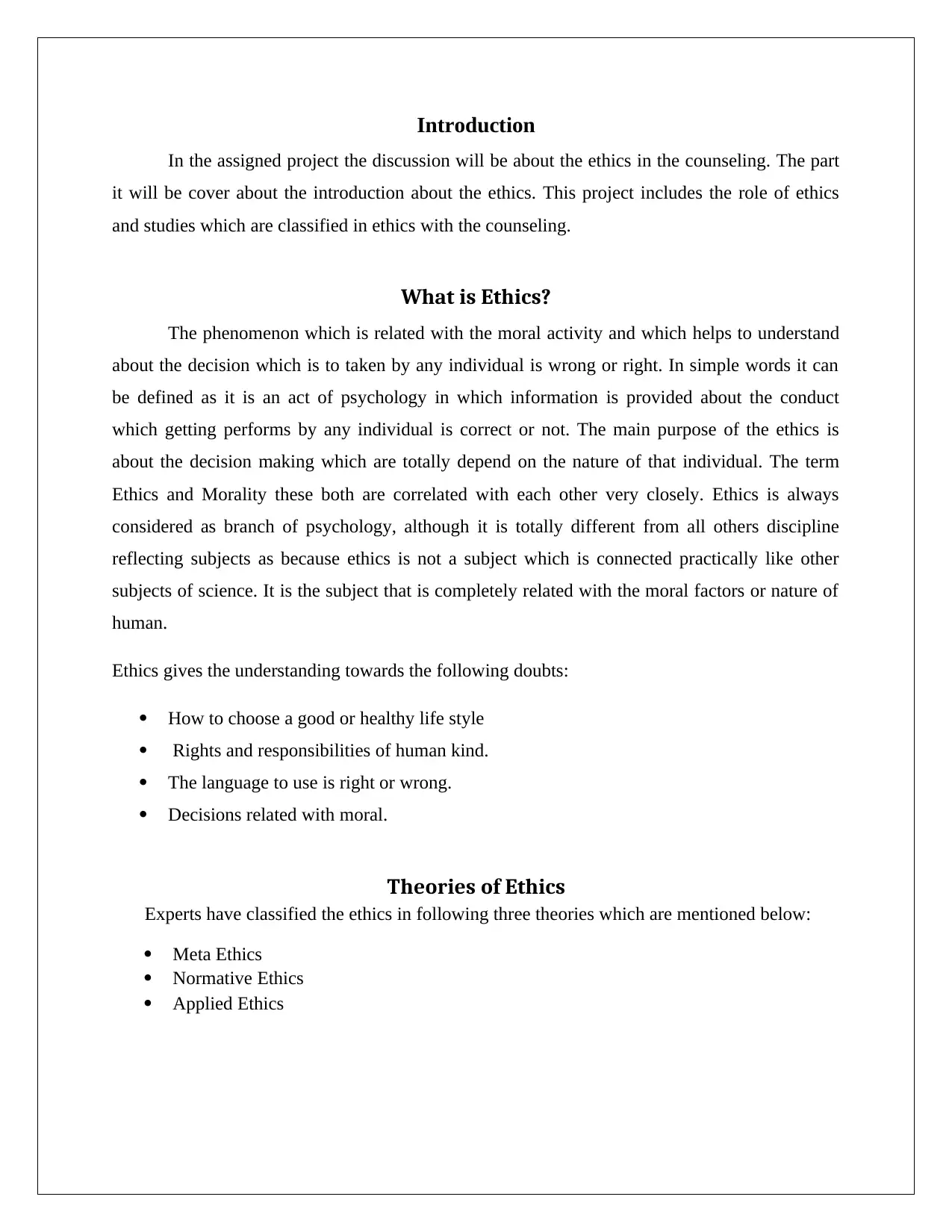
Introduction
In the assigned project the discussion will be about the ethics in the counseling. The part
it will be cover about the introduction about the ethics. This project includes the role of ethics
and studies which are classified in ethics with the counseling.
What is Ethics?
The phenomenon which is related with the moral activity and which helps to understand
about the decision which is to taken by any individual is wrong or right. In simple words it can
be defined as it is an act of psychology in which information is provided about the conduct
which getting performs by any individual is correct or not. The main purpose of the ethics is
about the decision making which are totally depend on the nature of that individual. The term
Ethics and Morality these both are correlated with each other very closely. Ethics is always
considered as branch of psychology, although it is totally different from all others discipline
reflecting subjects as because ethics is not a subject which is connected practically like other
subjects of science. It is the subject that is completely related with the moral factors or nature of
human.
Ethics gives the understanding towards the following doubts:
How to choose a good or healthy life style
Rights and responsibilities of human kind.
The language to use is right or wrong.
Decisions related with moral.
Theories of Ethics
Experts have classified the ethics in following three theories which are mentioned below:
Meta Ethics
Normative Ethics
Applied Ethics
In the assigned project the discussion will be about the ethics in the counseling. The part
it will be cover about the introduction about the ethics. This project includes the role of ethics
and studies which are classified in ethics with the counseling.
What is Ethics?
The phenomenon which is related with the moral activity and which helps to understand
about the decision which is to taken by any individual is wrong or right. In simple words it can
be defined as it is an act of psychology in which information is provided about the conduct
which getting performs by any individual is correct or not. The main purpose of the ethics is
about the decision making which are totally depend on the nature of that individual. The term
Ethics and Morality these both are correlated with each other very closely. Ethics is always
considered as branch of psychology, although it is totally different from all others discipline
reflecting subjects as because ethics is not a subject which is connected practically like other
subjects of science. It is the subject that is completely related with the moral factors or nature of
human.
Ethics gives the understanding towards the following doubts:
How to choose a good or healthy life style
Rights and responsibilities of human kind.
The language to use is right or wrong.
Decisions related with moral.
Theories of Ethics
Experts have classified the ethics in following three theories which are mentioned below:
Meta Ethics
Normative Ethics
Applied Ethics
⊘ This is a preview!⊘
Do you want full access?
Subscribe today to unlock all pages.

Trusted by 1+ million students worldwide
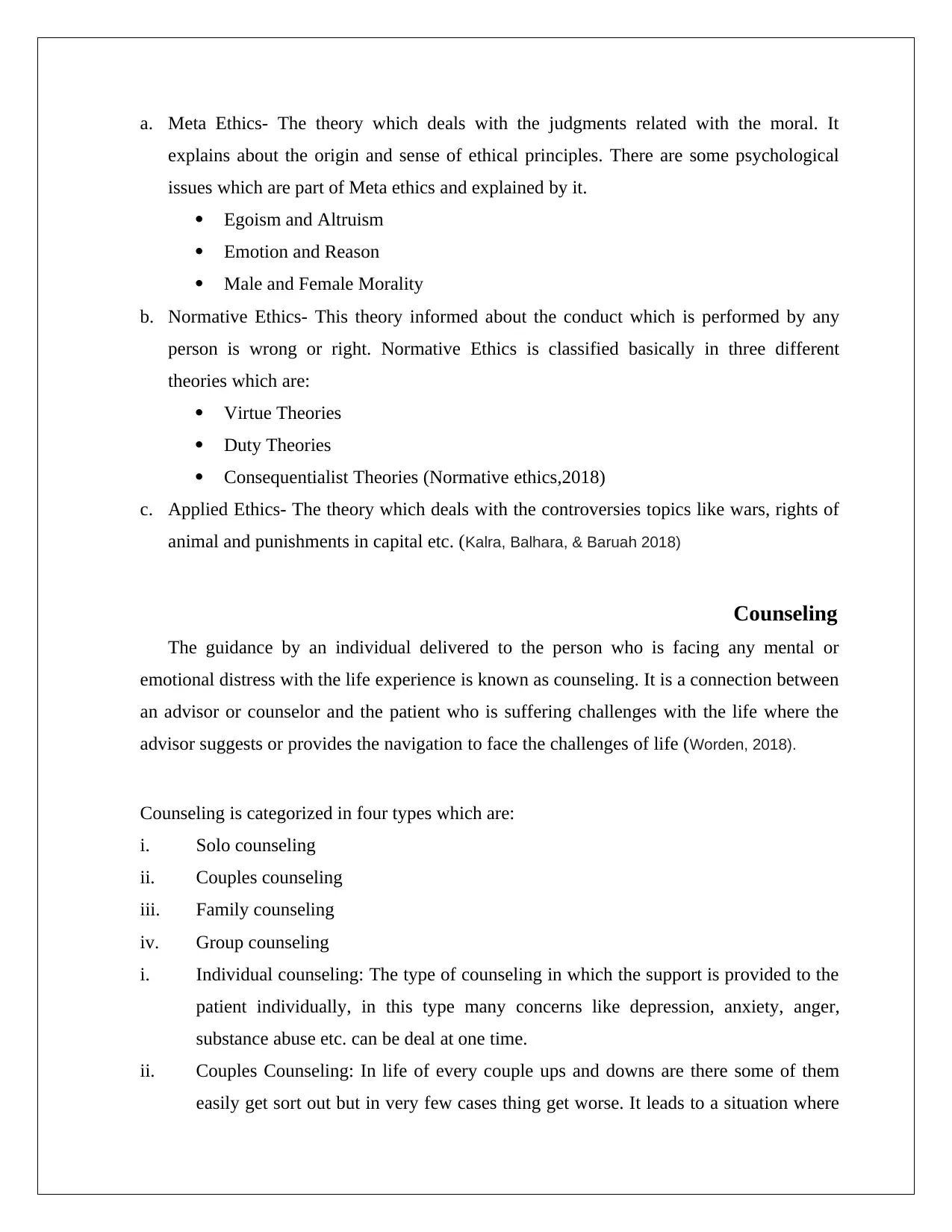
a. Meta Ethics- The theory which deals with the judgments related with the moral. It
explains about the origin and sense of ethical principles. There are some psychological
issues which are part of Meta ethics and explained by it.
Egoism and Altruism
Emotion and Reason
Male and Female Morality
b. Normative Ethics- This theory informed about the conduct which is performed by any
person is wrong or right. Normative Ethics is classified basically in three different
theories which are:
Virtue Theories
Duty Theories
Consequentialist Theories (Normative ethics,2018)
c. Applied Ethics- The theory which deals with the controversies topics like wars, rights of
animal and punishments in capital etc. (Kalra, Balhara, & Baruah 2018)
Counseling
The guidance by an individual delivered to the person who is facing any mental or
emotional distress with the life experience is known as counseling. It is a connection between
an advisor or counselor and the patient who is suffering challenges with the life where the
advisor suggests or provides the navigation to face the challenges of life (Worden, 2018).
Counseling is categorized in four types which are:
i. Solo counseling
ii. Couples counseling
iii. Family counseling
iv. Group counseling
i. Individual counseling: The type of counseling in which the support is provided to the
patient individually, in this type many concerns like depression, anxiety, anger,
substance abuse etc. can be deal at one time.
ii. Couples Counseling: In life of every couple ups and downs are there some of them
easily get sort out but in very few cases thing get worse. It leads to a situation where
explains about the origin and sense of ethical principles. There are some psychological
issues which are part of Meta ethics and explained by it.
Egoism and Altruism
Emotion and Reason
Male and Female Morality
b. Normative Ethics- This theory informed about the conduct which is performed by any
person is wrong or right. Normative Ethics is classified basically in three different
theories which are:
Virtue Theories
Duty Theories
Consequentialist Theories (Normative ethics,2018)
c. Applied Ethics- The theory which deals with the controversies topics like wars, rights of
animal and punishments in capital etc. (Kalra, Balhara, & Baruah 2018)
Counseling
The guidance by an individual delivered to the person who is facing any mental or
emotional distress with the life experience is known as counseling. It is a connection between
an advisor or counselor and the patient who is suffering challenges with the life where the
advisor suggests or provides the navigation to face the challenges of life (Worden, 2018).
Counseling is categorized in four types which are:
i. Solo counseling
ii. Couples counseling
iii. Family counseling
iv. Group counseling
i. Individual counseling: The type of counseling in which the support is provided to the
patient individually, in this type many concerns like depression, anxiety, anger,
substance abuse etc. can be deal at one time.
ii. Couples Counseling: In life of every couple ups and downs are there some of them
easily get sort out but in very few cases thing get worse. It leads to a situation where
Paraphrase This Document
Need a fresh take? Get an instant paraphrase of this document with our AI Paraphraser
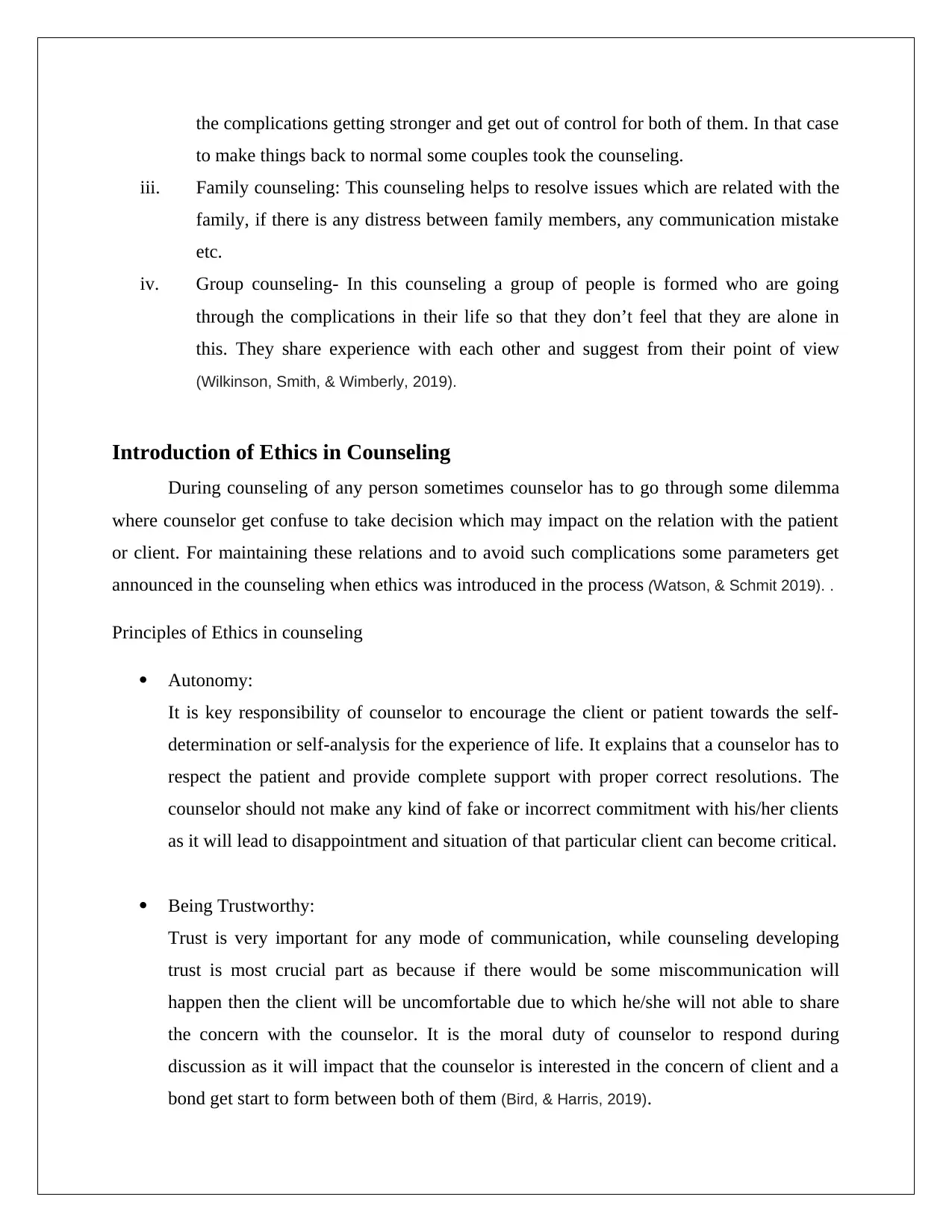
the complications getting stronger and get out of control for both of them. In that case
to make things back to normal some couples took the counseling.
iii. Family counseling: This counseling helps to resolve issues which are related with the
family, if there is any distress between family members, any communication mistake
etc.
iv. Group counseling- In this counseling a group of people is formed who are going
through the complications in their life so that they don’t feel that they are alone in
this. They share experience with each other and suggest from their point of view
(Wilkinson, Smith, & Wimberly, 2019).
Introduction of Ethics in Counseling
During counseling of any person sometimes counselor has to go through some dilemma
where counselor get confuse to take decision which may impact on the relation with the patient
or client. For maintaining these relations and to avoid such complications some parameters get
announced in the counseling when ethics was introduced in the process (Watson, & Schmit 2019). .
Principles of Ethics in counseling
Autonomy:
It is key responsibility of counselor to encourage the client or patient towards the self-
determination or self-analysis for the experience of life. It explains that a counselor has to
respect the patient and provide complete support with proper correct resolutions. The
counselor should not make any kind of fake or incorrect commitment with his/her clients
as it will lead to disappointment and situation of that particular client can become critical.
Being Trustworthy:
Trust is very important for any mode of communication, while counseling developing
trust is most crucial part as because if there would be some miscommunication will
happen then the client will be uncomfortable due to which he/she will not able to share
the concern with the counselor. It is the moral duty of counselor to respond during
discussion as it will impact that the counselor is interested in the concern of client and a
bond get start to form between both of them (Bird, & Harris, 2019).
to make things back to normal some couples took the counseling.
iii. Family counseling: This counseling helps to resolve issues which are related with the
family, if there is any distress between family members, any communication mistake
etc.
iv. Group counseling- In this counseling a group of people is formed who are going
through the complications in their life so that they don’t feel that they are alone in
this. They share experience with each other and suggest from their point of view
(Wilkinson, Smith, & Wimberly, 2019).
Introduction of Ethics in Counseling
During counseling of any person sometimes counselor has to go through some dilemma
where counselor get confuse to take decision which may impact on the relation with the patient
or client. For maintaining these relations and to avoid such complications some parameters get
announced in the counseling when ethics was introduced in the process (Watson, & Schmit 2019). .
Principles of Ethics in counseling
Autonomy:
It is key responsibility of counselor to encourage the client or patient towards the self-
determination or self-analysis for the experience of life. It explains that a counselor has to
respect the patient and provide complete support with proper correct resolutions. The
counselor should not make any kind of fake or incorrect commitment with his/her clients
as it will lead to disappointment and situation of that particular client can become critical.
Being Trustworthy:
Trust is very important for any mode of communication, while counseling developing
trust is most crucial part as because if there would be some miscommunication will
happen then the client will be uncomfortable due to which he/she will not able to share
the concern with the counselor. It is the moral duty of counselor to respond during
discussion as it will impact that the counselor is interested in the concern of client and a
bond get start to form between both of them (Bird, & Harris, 2019).
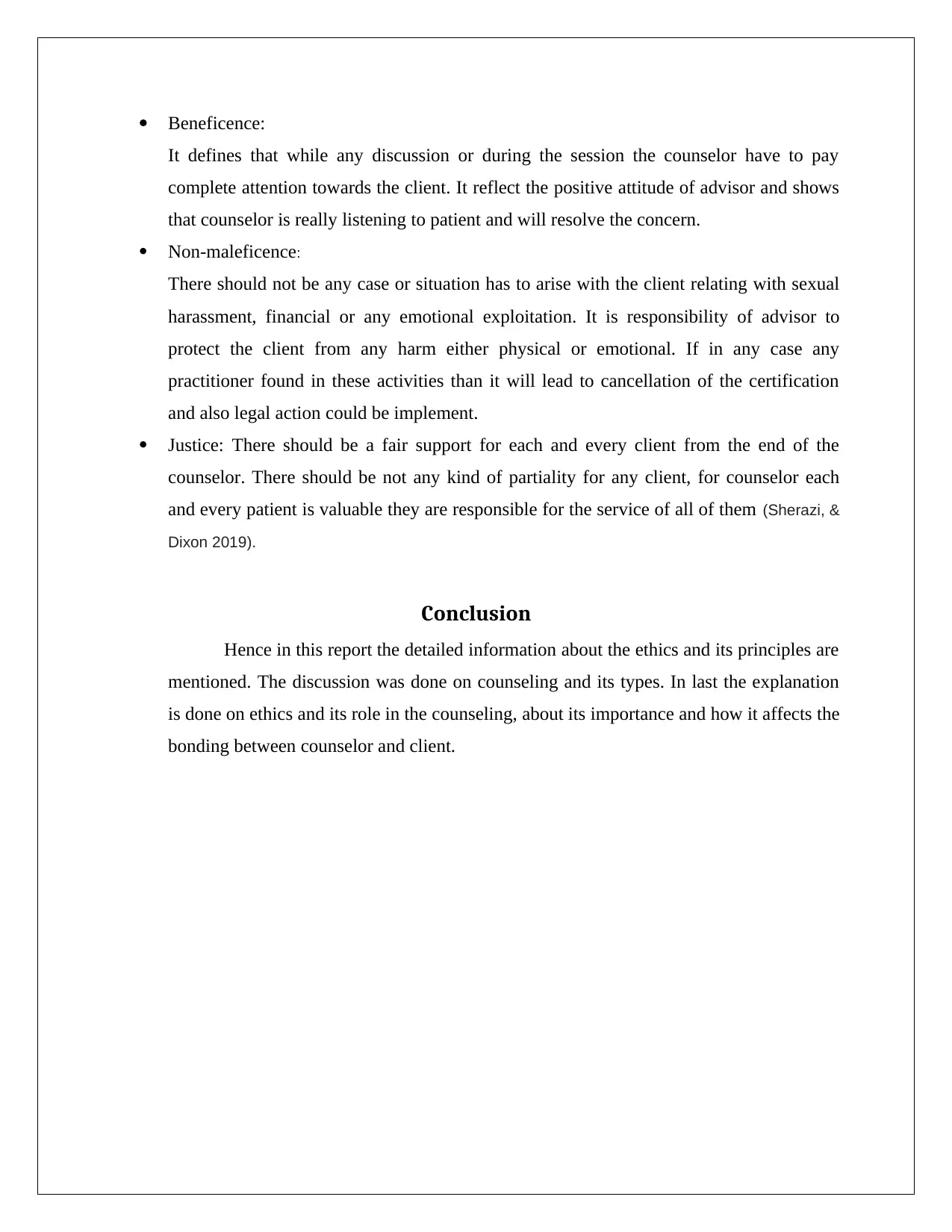
Beneficence:
It defines that while any discussion or during the session the counselor have to pay
complete attention towards the client. It reflect the positive attitude of advisor and shows
that counselor is really listening to patient and will resolve the concern.
Non-maleficence:
There should not be any case or situation has to arise with the client relating with sexual
harassment, financial or any emotional exploitation. It is responsibility of advisor to
protect the client from any harm either physical or emotional. If in any case any
practitioner found in these activities than it will lead to cancellation of the certification
and also legal action could be implement.
Justice: There should be a fair support for each and every client from the end of the
counselor. There should be not any kind of partiality for any client, for counselor each
and every patient is valuable they are responsible for the service of all of them (Sherazi, &
Dixon 2019).
Conclusion
Hence in this report the detailed information about the ethics and its principles are
mentioned. The discussion was done on counseling and its types. In last the explanation
is done on ethics and its role in the counseling, about its importance and how it affects the
bonding between counselor and client.
It defines that while any discussion or during the session the counselor have to pay
complete attention towards the client. It reflect the positive attitude of advisor and shows
that counselor is really listening to patient and will resolve the concern.
Non-maleficence:
There should not be any case or situation has to arise with the client relating with sexual
harassment, financial or any emotional exploitation. It is responsibility of advisor to
protect the client from any harm either physical or emotional. If in any case any
practitioner found in these activities than it will lead to cancellation of the certification
and also legal action could be implement.
Justice: There should be a fair support for each and every client from the end of the
counselor. There should be not any kind of partiality for any client, for counselor each
and every patient is valuable they are responsible for the service of all of them (Sherazi, &
Dixon 2019).
Conclusion
Hence in this report the detailed information about the ethics and its principles are
mentioned. The discussion was done on counseling and its types. In last the explanation
is done on ethics and its role in the counseling, about its importance and how it affects the
bonding between counselor and client.
⊘ This is a preview!⊘
Do you want full access?
Subscribe today to unlock all pages.

Trusted by 1+ million students worldwide
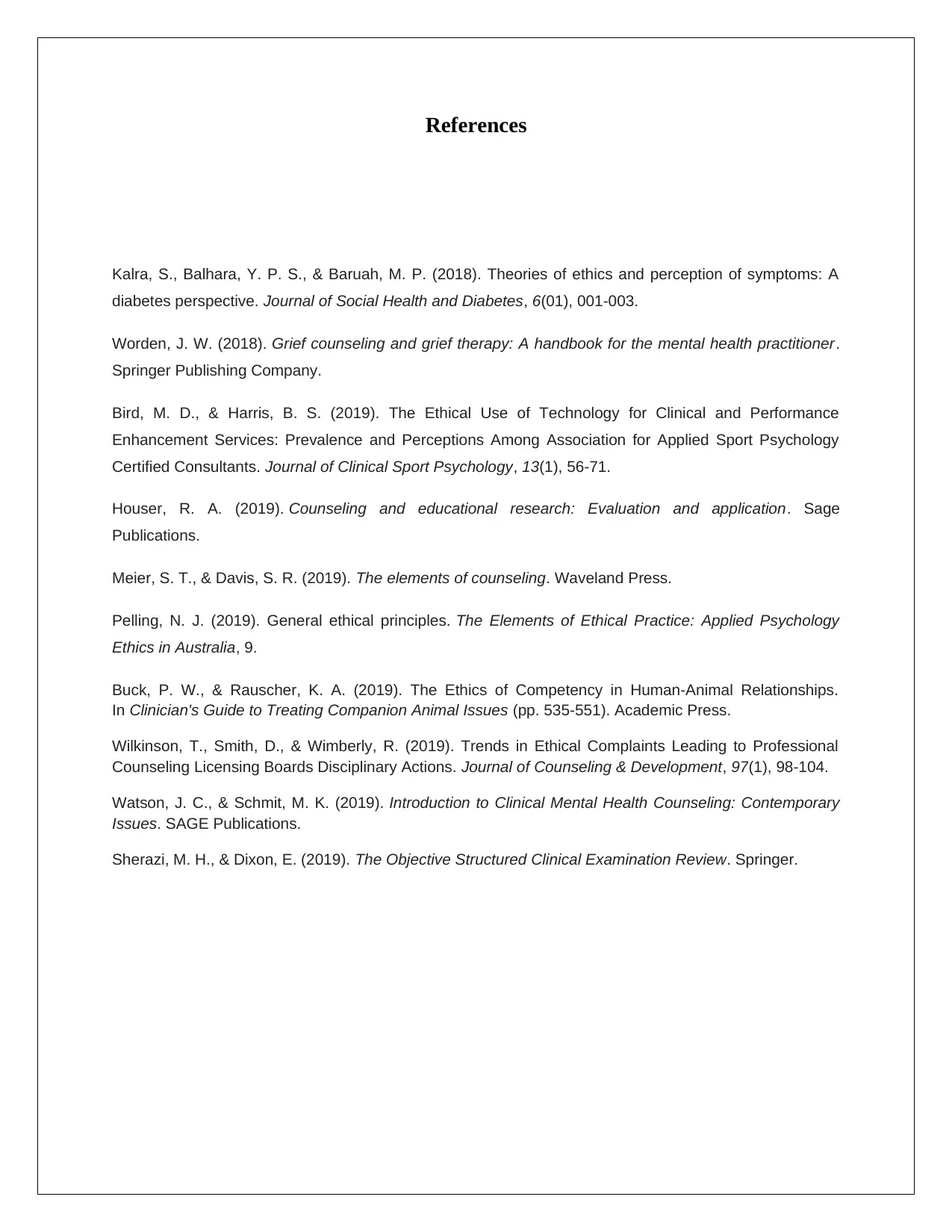
References
Kalra, S., Balhara, Y. P. S., & Baruah, M. P. (2018). Theories of ethics and perception of symptoms: A
diabetes perspective. Journal of Social Health and Diabetes, 6(01), 001-003.
Worden, J. W. (2018). Grief counseling and grief therapy: A handbook for the mental health practitioner.
Springer Publishing Company.
Bird, M. D., & Harris, B. S. (2019). The Ethical Use of Technology for Clinical and Performance
Enhancement Services: Prevalence and Perceptions Among Association for Applied Sport Psychology
Certified Consultants. Journal of Clinical Sport Psychology, 13(1), 56-71.
Houser, R. A. (2019). Counseling and educational research: Evaluation and application. Sage
Publications.
Meier, S. T., & Davis, S. R. (2019). The elements of counseling. Waveland Press.
Pelling, N. J. (2019). General ethical principles. The Elements of Ethical Practice: Applied Psychology
Ethics in Australia, 9.
Buck, P. W., & Rauscher, K. A. (2019). The Ethics of Competency in Human-Animal Relationships.
In Clinician's Guide to Treating Companion Animal Issues (pp. 535-551). Academic Press.
Wilkinson, T., Smith, D., & Wimberly, R. (2019). Trends in Ethical Complaints Leading to Professional
Counseling Licensing Boards Disciplinary Actions. Journal of Counseling & Development, 97(1), 98-104.
Watson, J. C., & Schmit, M. K. (2019). Introduction to Clinical Mental Health Counseling: Contemporary
Issues. SAGE Publications.
Sherazi, M. H., & Dixon, E. (2019). The Objective Structured Clinical Examination Review. Springer.
Kalra, S., Balhara, Y. P. S., & Baruah, M. P. (2018). Theories of ethics and perception of symptoms: A
diabetes perspective. Journal of Social Health and Diabetes, 6(01), 001-003.
Worden, J. W. (2018). Grief counseling and grief therapy: A handbook for the mental health practitioner.
Springer Publishing Company.
Bird, M. D., & Harris, B. S. (2019). The Ethical Use of Technology for Clinical and Performance
Enhancement Services: Prevalence and Perceptions Among Association for Applied Sport Psychology
Certified Consultants. Journal of Clinical Sport Psychology, 13(1), 56-71.
Houser, R. A. (2019). Counseling and educational research: Evaluation and application. Sage
Publications.
Meier, S. T., & Davis, S. R. (2019). The elements of counseling. Waveland Press.
Pelling, N. J. (2019). General ethical principles. The Elements of Ethical Practice: Applied Psychology
Ethics in Australia, 9.
Buck, P. W., & Rauscher, K. A. (2019). The Ethics of Competency in Human-Animal Relationships.
In Clinician's Guide to Treating Companion Animal Issues (pp. 535-551). Academic Press.
Wilkinson, T., Smith, D., & Wimberly, R. (2019). Trends in Ethical Complaints Leading to Professional
Counseling Licensing Boards Disciplinary Actions. Journal of Counseling & Development, 97(1), 98-104.
Watson, J. C., & Schmit, M. K. (2019). Introduction to Clinical Mental Health Counseling: Contemporary
Issues. SAGE Publications.
Sherazi, M. H., & Dixon, E. (2019). The Objective Structured Clinical Examination Review. Springer.
1 out of 7
Related Documents
Your All-in-One AI-Powered Toolkit for Academic Success.
+13062052269
info@desklib.com
Available 24*7 on WhatsApp / Email
![[object Object]](/_next/static/media/star-bottom.7253800d.svg)
Unlock your academic potential
Copyright © 2020–2026 A2Z Services. All Rights Reserved. Developed and managed by ZUCOL.





